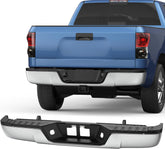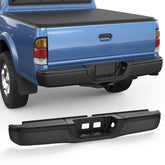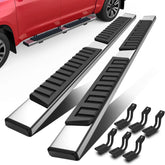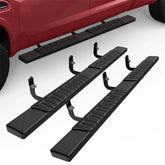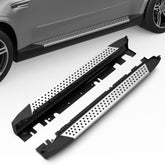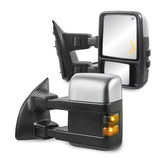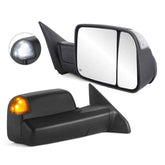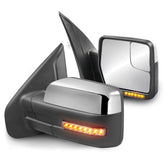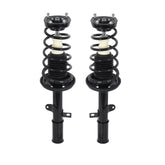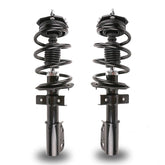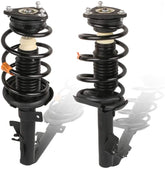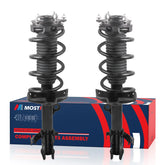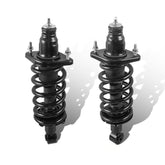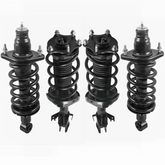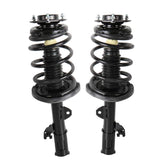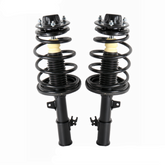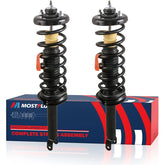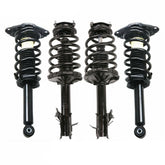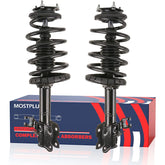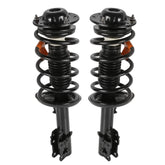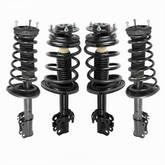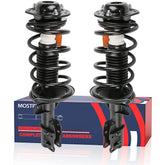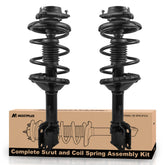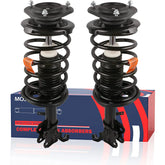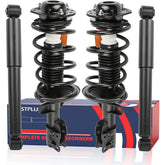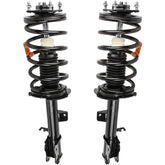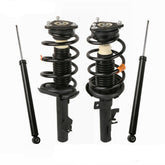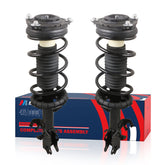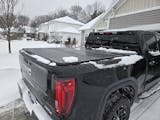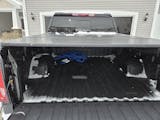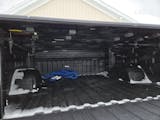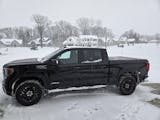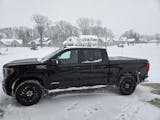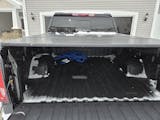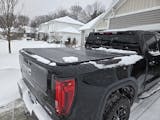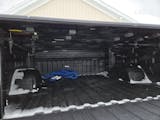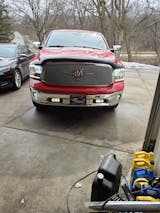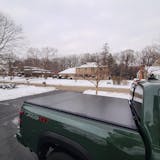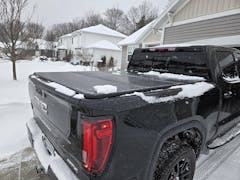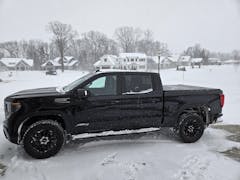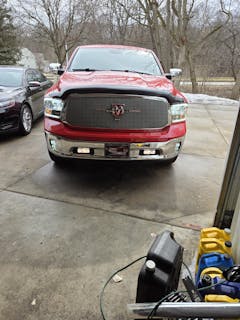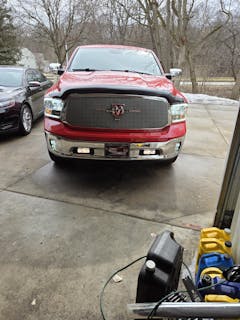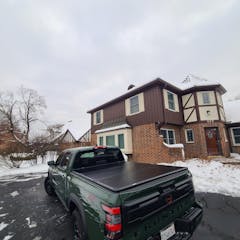Filter
222 results
20
- 10
- 15
- 20
- 25
- 30
- 50
Featured
- Featured
- Best selling
- Alphabetically, A-Z
- Alphabetically, Z-A
- Price, low to high
- Price, high to low
- Date, old to new
- Date, new to old
Sort
Sort by:
- Featured
- Best selling
- Alphabetically, A-Z
- Alphabetically, Z-A
- Price, low to high
- Price, high to low
- Date, old to new
- Date, new to old
-
2x Rear Struts & Coil Spring Assembly For 1993-2002 Toyota Corolla, 1998-2002 Chevrolet Prizm 171953 171954 (Set of 2)Vendor: MOSTPLUSMOSTPLUS Rear Driver & Passenger Struts Compatible with 1993 1994 1995 1996 1997 1998 1999 2000 2001 2002 Toyota Corolla, 1998 1999 2000 2001 2002 Chevrolet Prizm and 1993-1997 Geo Prizm 171953 171954 (Set of 2) SPECIFICATION: Brand: MOSTPLUS Warranty: 1 Year Surface Finish: Black Stock Parts Direct Replacement Installation...
- $125.99
- $125.99
- Unit price
- / per
-
2x Front Struts Shock Absorbers For 2008-2012 Buick Enclave, Chevy Traverse, GMC Acadia, Saturn Outlook 172518 1333404Vendor: MOSTPLUSMOSTPLUS Front Driver & Passenger Complete Struts Assembly Gas Shocks Compatible with 2008-2012 Buick Enclave, 2009-2012 Chevrolet Traverse, 2007-2012 GMC Acadia, 2007-2010 Saturn Outlook (Set of 2) SPECIFICATION: Brand: MOSTPLUS Warranty: 1 Year Stock parts direct replacement Surface Finish: Black Including 2 x Front Shock Absorbers Installation Position: Front Driver...
- $172.98
- $172.98
- Unit price
- / per
-
2x Front Shock Struts w/ Spring For 2004-2013 Mazda 3 2006-2010 MAZDA 5 Set(2)Vendor: MOSTPLUSMOSTPLUS Front Driver & Passenger Complete Strut Spring 172263 172264 Compatible with 2004 2005 2006 2007 2008 2009 2010 2011 2012 2013 Mazda 3 & 2006 2007 2008 2009 2010 MAZDA 5 Keep stability: The upper strut ensure stability, and the lower spring isolator prevents metal...
- $142.99
- $142.99
- Unit price
- / per
-
2x Front Complete Shocks Struts Assembly For 2007-2014 Honda CR-V CRV 2.4LVendor: MOSTPLUSMOSTPLUS shock absorber & strut assembly provide unmatched quality, durability and fit. For premium performance, tested to strict durability standards to restore your vehicle's drivability and ride height. Features a preassembled upper mount, shock, compression bumper, and dirt shield matching OE design for simplified...
- $169.99
- $169.99
- Unit price
- / per
-
2x Rear Complete Shock Struts & Coil Spring Assembly For 2007-2011 Honda CRV CR-V Sport Utility 2.4LVendor: MOSTPLUSMOSTPLUS Set of 2 Rear Struts for 2004 2005 2006 Toyota Camry/Solara & Lexus ES330. They Provide Superior Handling, Stability, and Control, Giving Drivers a Smoother and Safer Ride. SPECIFICATION: Brand: MOSTPLUS Warranty: 1 Year Surface Finish: Rust Protected & Black Installation Position: Rear Driver & Passenger Side Including 2x Rear Struts...
- $119.99
- $119.99
- Unit price
- / per
-
4x Front & Rear Complete Strut & Coil Spring Assembly For 2007-2011 Honda CR-V CRV 2.4LVendor: MOSTPLUSMOSTPLUS shock absorber & strut assembly provide unmatched quality, durability and fit. For premium performance, tested to strict durability standards to restore your vehicle's drivability and ride height. Features a preassembled upper mount, shock, compression bumper, and dirt shield matching OE design for simplified...
- $264.99
$269.99- $264.99
- Unit price
- / per
-
2x Front Struts For 2006-2012 Toyota Avalon, 2007-2011 Toyota Camry, 2007-2009 Lexus ES350, 2006-2008 Toyota Solara LH+RH SetVendor: MOSTPLUSMOSTPLUS 2Pcs Front Complete Coil Springs Struts 172307 172308 Compatible with 2006-2012 Toyota Avalon, 2007-2011 Toyota Camry, 2007-2009 Lexus ES350, 2006-2008 Toyota Solara. MOSTPLUS Struts Provide Superior Handling, Stability, and Control, Giving Drivers a Smoother and Safer Ride. SPECIFICATION: Brand: MOSTPLUS Warranty: 1 Year Surface...
- $169.99
$174.99- $169.99
- Unit price
- / per
-
2x Front Complete Shock Struts For 1997-2001 Camry 1997-2003 Avalon 1999-2003 Solara Front(LH+RH)Vendor: MOSTPLUSMOSTPLUS shock absorber & strut assembly provide unmatched quality, durability and fit. For premium performance, tested to strict durability standards to restore your vehicle's drivability and ride height. Features a preassembled upper mount, shock, compression bumper, and dirt shield matching OE design for simplified...
- $165.99
$174.94- $165.99
- Unit price
- / per
-
2x Rear Shock Struts Assembly For 2008-2012 Honda Accord 172563 2PCS Rear Left+RightVendor: MOSTPLUSMOSTPLUS Rear Pair Complete Strut Spring Assembly Compatible for 2008 2009 2010 2011 2012 Honda Accord Replaces 172563 Left & Right Shock Coil SPECIFICATION: Brand: MOSTPLUS Warranty: 1 Year Surface Finish: Black Including 2 x Rear Strut Absorbers Placement on Vehicle: Rear Left and Right OEM Part...
- $117.99
$121.99- $117.99
- Unit price
- / per
-
4x Front & Rear Complete Struts w/ Coil Spring Assembly for 2002-2006 Nissan Sentra 1.8L/2.5L L4 (Set of 4)Vendor: MOSTPLUSMOSTPLUS shock absorber & strut assembly provide unmatched quality, durability and fit. For premium performance, tested to strict durability standards to restore your vehicle's drivability and ride height. Features a preassembled upper mount, shock, compression bumper, and dirt shield matching OE design for simplified...
- $232.99
- $232.99
- Unit price
- / per
-
Front Complete Struts & Coil Spring For 2002-2006 Nissan Sentra 1.8L Models (Set of 2)Vendor: MOSTPLUSMOSTPLUS shock absorber & strut assembly provide unmatched quality, durability and fit. For premium performance, tested to strict durability standards to restore your vehicle's drivability and ride height. Features a preassembled upper mount, shock, compression bumper, and dirt shield matching OE design for simplified...
- $128.99
- $128.99
- Unit price
- / per
-
Front Shock Struts w/ Springs Assembly For Chevy Malibu Pontiac G6 Saturn Aura 2PCSVendor: MOSTPLUSMOSTPLUS shock absorber & strut assembly provide unmatched quality, durability and fit. For premium performance, tested to strict durability standards to restore your vehicle's drivability and ride height. Features a preassembled upper mount, shock, compression bumper, and dirt shield matching OE design for simplified...
- $135.99
- $135.99
- Unit price
- / per
-
Front+Rear Complete Shock Struts For 2007-2011 Toyota Camry 2.4L (Set of 4)Vendor: MOSTPLUSMOSTPLUS 4PCS Front & Rear Complete Strut Assemblies w/ Coil Spring 172307 172308 172309 172310 Compatible with 2007 2008 2009 2010 2011 Toyota Camry (4PCS) Keep stability: The upper strut ensure stability, and the lower spring isolator prevents metal contact and reduces vibration. SPECIFICATION: Brand: MOSTPLUS...
- $319.98
- $319.98
- Unit price
- / per
-
Front Complete Struts w/ Coil Springs For 2005-2010 Chevrolet Cobalt 2PCSVendor: MOSTPLUSMOSTPLUS Front Complete Strut Shock Absorber Compatible with 2005 2006 2007 2008 2009 2010 Chevrolet Cobalt 172179R 172179L(Set of 2) Keep stability: The upper strut ensure stability, and the lower spring isolator preventsmetals contact and reduce vibration. SPECIFICATION: Brand: MOSTPLUS Warranty: 1 Year Stock Parts...
- $149.80
- $149.80
- Unit price
- / per
-
2x Front Complete Shock Struts w/ Coil Spring Assembly For 2000-2004 Subaru Outback AWD 11853 11854Vendor: MOSTPLUSMOSTPLUS shock absorber & strut assembly provide unmatched quality, durability and fit. For premium performance, tested to strict durability standards to restore your vehicle's drivability and ride height. Features a preassembled upper mount, shock, compression bumper, and dirt shield matching OE design for simplified...
- $146.99
$151.99- $146.99
- Unit price
- / per
-
2x Front Complete Shock Struts w/ Coil Springs For 1993-2002 Toyota CorollaVendor: MOSTPLUSMOSTPLUS shock absorber & strut assembly provide unmatched quality, durability and fit. For premium performance, tested to strict durability standards to restore your vehicle's drivability and ride height. Features a preassembled upper mount, shock, compression bumper, and dirt shield matching OE design for simplified...
- $135.59
- $135.59
- Unit price
- / per
-
Front & Rear Shocks Struts For Chevy 2005-2010 Cobalt, 2006-2011 HHR, 2007-2009 Pontiac G5, 2005-2006 Pursuit (Set of 4)Vendor: MOSTPLUSMOSTPLUS shock absorber & strut assembly provide unmatched quality, durability and fit. For premium performance, tested to strict durability standards to restore your vehicle's drivability and ride height. Features a preassembled upper mount, shock, compression bumper, and dirt shield matching OE design for simplified...
- $165.99
- $165.99
- Unit price
- / per
-
2PCS Front Complete Shocks Struts For 2001-2012 Ford Escape, 2005-2011 Mercury Mariner, 2001-2006 & 2008-2011 Mazda Tribute LH+RHVendor: MOSTPLUSMOSTPLUS LH+RH Set Front Quick Complete Struts Shocks Absorbers Compatible with 2001-2012 Ford Escape, 2001-2006 2008-2011 Mazda Tribute, 2005-2011 Mercury Mariner 171593 171594 Keep stability: The upper struts ensure stability, and the lower spring isolator prevents metal contact and reduces vibration. SPECIFICATION: Brand: MOSTPLUS Warranty: 1 Year...
- $159.99
$175.80- $159.99
- Unit price
- / per
-
4x Front+Rear Complete Shocks Struts For 2004-2009 Mazda 3, 2006-2010 Mazda 5 172263 172264 (Set of 4)Vendor: MOSTPLUSMOSTPLUS 4PCS Front Rear Complete Strut Spring Assemblies Shock Absorbers 172263 172264 Compatible for 2004 2005 2006 2007 2008 2009 Mazda 3, 2006 2007 2008 2009 2010 Mazda 5. MOSTPLUS Struts Provide Superior Handling, Stability, and Control, Giving Drivers a Smoother and Safer Ride. Keep Stability: The...
- $168.99
$183.99- $168.99
- Unit price
- / per
-
Pair Front Shock Struts Assembly For 2007-2012 Nissan Versa 172351 172352 Set(2)Vendor: MOSTPLUSMOSTPLUS 2PCS Front Complete Strut Spring Assembly Compatible with 2007 2008 2009 2010 2011 2012 Nissan Versa Replaces 172351 172352 Left and Right Shock Coil SPECIFICATION: Brand: MOSTPLUS Warranty: 1 Year Surface Finish: Black Placement on Vehicle: Front Left and Right OEM Part Number: 172351,172352...
- $127.99
- $127.99
- Unit price
- / per


